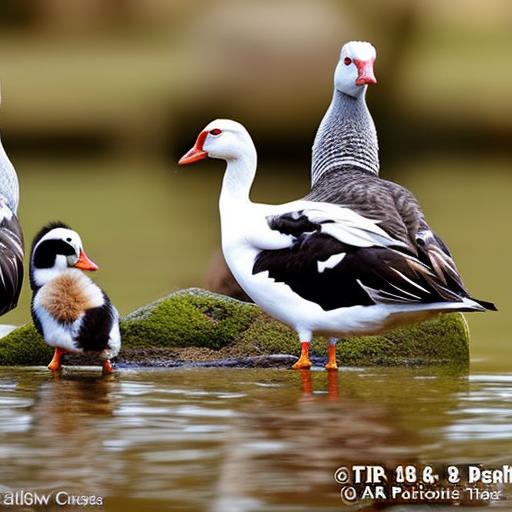Domestic geese are a popular and versatile type of poultry that have been domesticated for thousands of years. They are known for their calm and gentle nature, making them a popular choice for small farms and homesteads. There are many different breeds of domestic geese, each with its own unique characteristics and traits. From the majestic Toulouse to the hardy Chinese, domestic geese come in a wide variety of sizes, colors, and temperaments. In this article, we will explore the history, characteristics, and care of domestic geese, as well as their role on farms and in urban settings.
The History of Domestic Geese
The domestication of geese can be traced back to ancient times, with evidence of domestic geese dating back to at least 3,000 BC in Egypt. Geese were valued for their meat, eggs, and feathers, and were often kept by the wealthy as a sign of status and wealth. Over time, geese spread throughout Europe and Asia, with different breeds developing in different regions. In the Middle Ages, geese were an important part of the peasant diet, and were often kept in large flocks on farms. Today, domestic geese are still valued for their meat and eggs, as well as for their role in pest control and as pets.
Popular Domestic Geese Breeds
There are many different breeds of domestic geese, each with its own unique characteristics and traits. Some of the most popular breeds include the Toulouse, Embden, Chinese, and African. The Toulouse is a large and majestic breed, known for its calm and gentle nature. The Embden is a hardy and productive breed, valued for its meat and eggs. The Chinese is a smaller breed, known for its striking appearance and friendly disposition. The African is a smaller breed with a distinctive knob on its head, and is valued for its meat and eggs. Each breed has its own unique characteristics and traits, making it important to research and choose the right breed for your specific needs and environment.
Characteristics and Physical Features of Domestic Geese
Domestic geese come in a wide variety of sizes, colors, and temperaments. They are known for their calm and gentle nature, and are often kept as pets or for pest control on farms. Geese are social animals, and are happiest when kept in small flocks. They are also highly intelligent and can be trained to perform simple tasks. Geese are also known for their distinctive honking call, which they use to communicate with each other and to alert their owners to potential threats. In terms of physical features, domestic geese have a long neck, a stout body, and a distinctive bill. They come in a wide variety of colors, including white, gray, and brown, and some breeds have distinctive markings or patterns.
The Role of Domestic Geese on Farms
Domestic geese play a valuable role on farms, serving as both pest controllers and producers of meat and eggs. Geese are natural grazers, and are highly effective at controlling weeds and insects in fields and gardens. They are also valued for their meat, which is lean and flavorful, and for their eggs, which are rich and nutritious. Geese are also known for their down feathers, which are used to make pillows, comforters, and other bedding products. In addition to their practical uses, geese are also valued for their calm and gentle nature, making them a popular choice for small farms and homesteads.
Caring for Domestic Geese
Caring for domestic geese is relatively straightforward, but it does require some knowledge and preparation. Geese need access to fresh water for drinking and bathing, as well as a balanced diet of grains, greens, and protein. They also need access to a safe and secure shelter, as well as plenty of space to roam and graze. Geese are social animals, and are happiest when kept in small flocks, so it is important to provide them with companionship and social interaction. Geese also need regular veterinary care, including vaccinations and parasite control, to ensure their health and well-being.
Breeding and Reproduction of Domestic Geese
Breeding and reproduction of domestic geese is a natural and straightforward process, but it does require some knowledge and preparation. Geese reach sexual maturity at around 6-9 months of age, and will begin to lay eggs in the spring. Geese are monogamous and will mate for life, with the male and female forming a strong bond. Geese are also known for their strong maternal instincts, and will fiercely protect their eggs and goslings from potential threats. It is important to provide geese with a safe and secure nesting area, as well as plenty of space and privacy for breeding and raising their young.
Common Health Issues in Domestic Geese
Like all animals, domestic geese are susceptible to a variety of health issues, including parasites, respiratory infections, and injuries. It is important to provide geese with regular veterinary care, including vaccinations and parasite control, to ensure their health and well-being. Geese also need access to a balanced diet and clean water, as well as a safe and secure shelter, to prevent illness and injury. It is also important to provide geese with plenty of space to roam and graze, as well as companionship and social interaction, to prevent stress and boredom.
Domestic Geese in Urban Settings
While domestic geese are most commonly found on farms and homesteads, they can also be kept in urban settings under the right conditions. Geese need access to fresh water for drinking and bathing, as well as a balanced diet of grains, greens, and protein. They also need access to a safe and secure shelter, as well as plenty of space to roam and graze. Geese are social animals, and are happiest when kept in small flocks, so it is important to provide them with companionship and social interaction. It is also important to check local regulations and ordinances before keeping geese in an urban setting, as some areas may have restrictions on the keeping of poultry.
Conclusion and Resources for Further Learning
In conclusion, domestic geese are a popular and versatile type of poultry that have been domesticated for thousands of years. They are known for their calm and gentle nature, making them a popular choice for small farms and homesteads. There are many different breeds of domestic geese, each with its own unique characteristics and traits. Geese play a valuable role on farms, serving as both pest controllers and producers of meat and eggs. Caring for domestic geese is relatively straightforward, but it does require some knowledge and preparation. Breeding and reproduction of domestic geese is a natural and straightforward process, but it does require some knowledge and preparation. Like all animals, domestic geese are susceptible to a variety of health issues, so it is important to provide them with regular veterinary care. While domestic geese are most commonly found on farms and homesteads, they can also be kept in urban settings under the right conditions. For those interested in learning more about domestic geese, there are many resources available, including books, websites, and local poultry clubs and organizations. By learning more about domestic geese, you can ensure their health and well-being, and enjoy the many benefits they provide.
Meet Walter, the feathered-friend fanatic of Florida! Nestled in the sunshine state, Walter struts through life with his feathered companions, clucking his way to happiness. With a coop that’s fancier than a five-star hotel, he’s the Don Juan of the chicken world. When he’s not teaching his hens to do the cha-cha, you’ll find him in a heated debate with his prized rooster, Sir Clucks-a-Lot. Walter’s poultry passion is no yolk; he’s the sunny-side-up guy you never knew you needed in your flock of friends!







